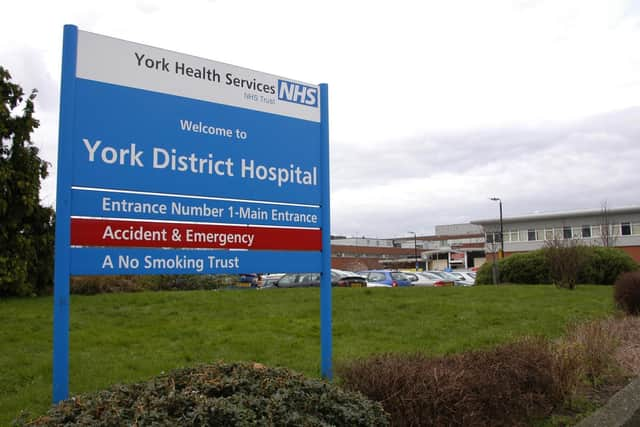Yorkshire midwives having to work 24-hour shifts as babies' lives put at risk due to cover staff shortages
Staff shortages have meant that community midwives have been working 24 hour shifts and women in labour have been diverted to other hospitals due to lack of capacity.
A review in April found a shortfall of 21 midwives across the York and Scarborough units, when measured against the ‘Birthrate Plus’ recommendations, a way of measuring safe staffing for maternity services.
Advertisement
Hide AdAdvertisement
Hide AdThe trust is cooperating with the Care Quality Commission in an investigation after the whistleblower raised concerns, the hospital trust’s board papers show.


The papers also state the the number of serious incidents across all of the trust’s services “associated with the delivery of fundematal care” is “of concern.”
The concerned staff member wrote: “When fully staffed, the labour ward has four midwives for 14 beds, beds that are often filled with increasingly high-risk patients who require one-to-one care. Additionally, the unit is never fully staffed anymore, or even close.”
Community midwives are expected to attend the unit on-call overnight to help, the whistleblower said.
Advertisement
Hide AdAdvertisement
Hide AdThey added: “This often manifests in community midwives working a day shift 8.30am-4.30pm, going to the unit to help with staffing at 4.30pm, then not leaving until 7am the following day.
“The best midwife in the world would not be able to make safe choices for women and babies on a 24 hour shift.”
It is not clear whether the whistleblower is referring to the York or Scarborough unit.
According to board papers from the Vale of York Clinical Commissioning Group (CCG): “Immediate actions to ensure safety is not compromised is however resulting in…increased frequency of the need to suspend the home birth service; request women transfer to Scarborough for planned induction and an increased frequency of diverting women in labour to alternative hospitals.”
Advertisement
Hide AdAdvertisement
Hide AdOne new mum said she was not induced on the day she was supposed to be at York Hospital due to staffing issues, instead being sent to Leeds after going into labour naturally the next day.
She said she understood why it was necessary, but added: “Having that extra distance between the hospital and home adds a level of stress and anxiety that you can do without at what should be a completely magical time. We’re able to laugh about it now but at the time I kept wanting to cry.”
Michelle Carrington, executive director of quality and nursing at the CCG, said at a recent meeting: “It’s not specific to York but we are keeping a very, very close eye on it.
“We are so significantly concerned that we are asking the governing body if they will adopt that risk.”
Advertisement
Hide AdAdvertisement
Hide AdA statement from the trust said: “Patient safety is our priority and our staff work hard to ensure this is not compromised. Many maternity units are facing recruitment issues, and recruiting sufficient numbers of midwives has been challenging.
“We have plans in place to increase midwife numbers, including recruiting from overseas. We have also increased the number of support staff working in maternity, for example healthcare assistants, who can provide additional support and release time for midwives to provide care.”
A joint in-depth review of maternity services will take place with the Vale of York Clinical Commissioning Group (CCG) in January, the statement said.
“We take all concerns seriously and welcome feedback however it is raised with us,” it went on.
“Our midwives do an incredibly important job and they continue to provide support and care for patients in spite of the pressure they are facing.”
